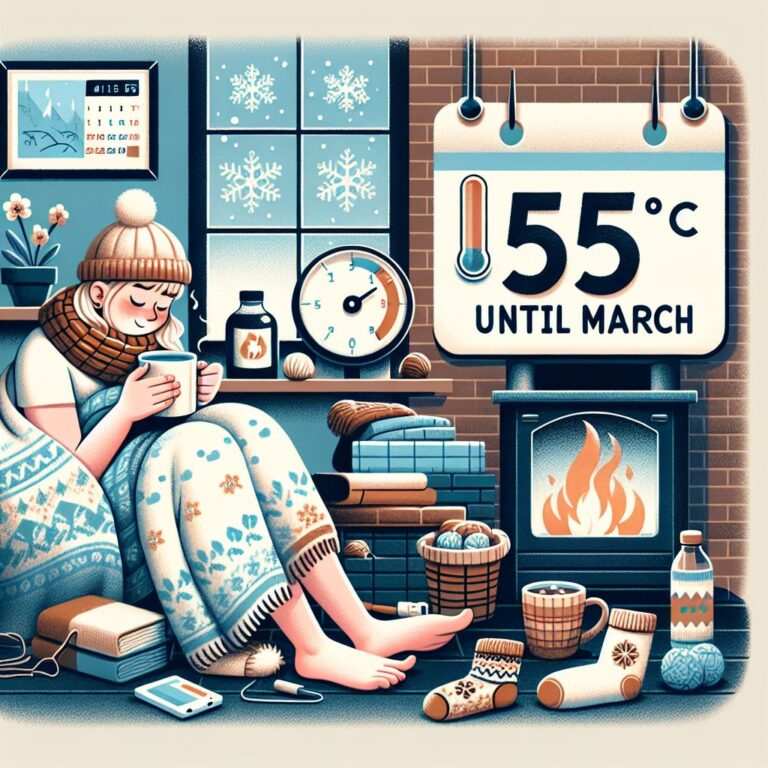Living in a household with a malfunctioning HVAC system can be a challenging and uncomfortable situation. The thought of enduring the winter months with a temperature as low as 55 degrees might seem daunting, but with proper planning and some handy tricks, it is definitely possible. In this article, we will explore tips and suggestions to help you stay warm and comfortable in your home until the HVAC system is fixed. Let’s dive in!
1. Assessing the Situation:
Before we delve into the tips, let’s understand the current scenario. You mentioned that your HVAC system started making a screeching whirling sound, and you are hesitant to call a technician due to potential high costs. It’s essential to recognize that a professional assessment is vital to determine the underlying issue and provide an accurate solution. You may consider exploring cost-effective options or searching for reputable technicians who offer affordable services.
2. Managing the Temperature:
a) Layer Up: Dressing in layers is a simple yet effective way to combat cold temperatures. Opt for thermal clothing, sweaters, and cozy blankets to keep yourself warm.
b) Insulation: Improve insulation in your home by sealing any gaps or cracks around windows and doors. Utilize draft stoppers to block cold air from seeping into the house.
c) Utilize Natural Heat Sources: During the day, open curtains and blinds to let sunlight in. Sunlight can naturally warm up your home and provide some relief from the chilly temperatures.
d) Consider Space Heaters: Investing in a reliable space heater can help maintain a comfortable temperature in specific areas of your home. Ensure to follow safety guidelines and never leave them unattended.
3. Protecting Your Plumbing:
You expressed concerns about potential pipe bursts. Although the house is unlikely to drop below 50 degrees, it’s still crucial to take precautions:
a) Keep the Faucets Dripping: Allowing faucets to drip slightly can prevent pipes from freezing. Moving water is less likely to freeze, reducing the risk of bursts.
b) Insulate Exposed Pipes: Wrap exposed pipes with insulation sleeves to provide an extra layer of protection against freezing temperatures.
c) Open Cabinet Doors: If any of your plumbing runs along exterior walls, open the cabinet doors beneath the sinks to allow warm air to reach those pipes.
4. Practical Tips:
a) Use Sleeping Bags: At night, consider using sleeping bags or thermal blankets to stay warm in bed.
b) Hot Water Bottles: Fill up hot water bottles and place them near you to provide localized heat.
c) Warm Drinks: Indulge in hot beverages like tea, coffee, or hot cocoa to warm you up from the inside.
d) Cook and Bake: Utilize your oven more frequently for baking or cooking. The heat generated can help warm up your home.
e) Stay Active: Engage in physical activities to generate body heat and keep yourself warm.
FAQ – Frequently Asked Questions:
Q1: Is it safe to live in a 55-degree household for an extended period?
A1: While it may not be ideal, it is generally safe to live in such temperatures for a limited duration. However, it is crucial to monitor your comfort level and be aware of any potential health concerns.
Q2: Can pipes burst at temperatures above 50 degrees?
A2: The risk of pipes bursting significantly decreases as the temperature rises above freezing. However, it is advisable to take precautions to ensure their safety.
Q3: How can I identify a reputable and affordable HVAC technician?
A3: Research local technicians, read reviews, and ask for recommendations from friends or family to find reliable and cost-effective options.
Q4: Are there any temporary fixes I can attempt for the HVAC system myself?
A4: It is essential to consult the system’s manual and watch informative YouTube videos for troubleshooting tips. However, be cautious and do not attempt any repairs beyond your skill level.
Q5: Are there any emergency assistance programs available for those struggling with HVAC repairs?
A5: Some organizations or government programs offer financial assistance or low-cost repairs for individuals facing hardships. Research local resources to determine if you qualify.
Surviving a 55-degree household until March might not be ideal, but with careful consideration, preparation, and a positive mindset, it is possible to make the situation more manageable. Take the necessary steps to stay warm, protect your plumbing, and seek professional advice when needed. Remember, it’s crucial to prioritize your safety and well-being. Stay positive, and before you know it, your HVAC system will be up and running again, restoring comfort to your home.



